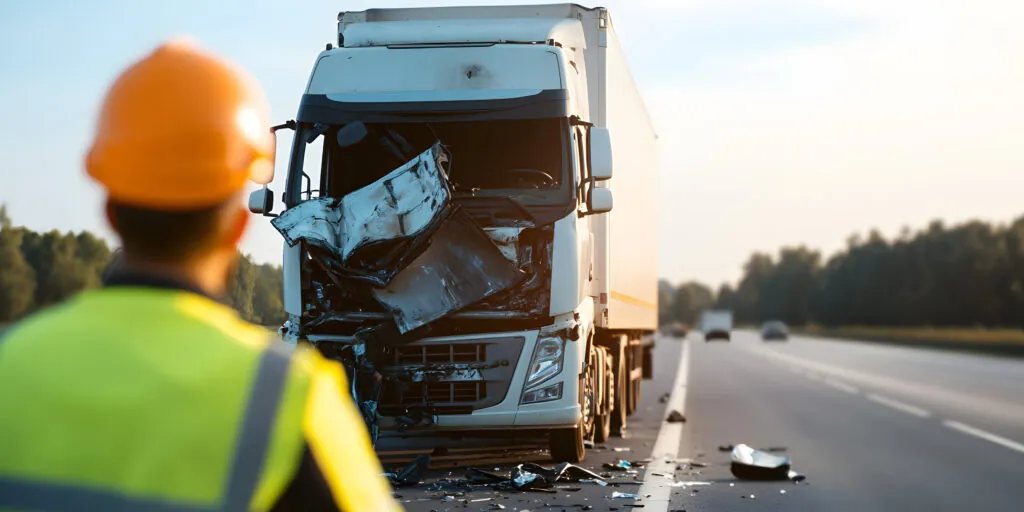Trucking accidents are among the most devastating incidents on the road. The massive size and weight of commercial vehicles can lead to life-altering injuries and significant property damage.
But the physical aftermath is only one part of the problem. For victims, navigating the legal process is just as daunting—especially when the trucking company denies liability and attempts to shift the blame to the driver.
The Common Tactic: Denying Responsibility
After an accident, many trucking companies claim they aren’t responsible for the crash. This is often done by saying the driver was an independent contractor, not an employee.
The goal of this tactic is simple: avoid financial and legal responsibility. If the company can distance itself from the driver, it hopes to escape liability for damages.
Why Companies Use the Independent Contractor Defense
The trucking industry frequently uses independent contractor arrangements. Companies claim that since the driver operated independently, the employer had no control—and therefore no liability.
But courts rarely accept this argument at face value. Labels alone are not enough.
Legal Reality: Control Over the Driver Matters Most
Even if the driver signed a contract stating they were an independent contractor, that doesn’t make it true in the eyes of the court.
What truly matters is how much control the company exercised over the driver. Did the company assign routes? Provide equipment? Monitor delivery schedules? If so, the court may find that the driver was actually functioning as an employee, no matter what the paperwork says.
How Courts Determine Employer Liability
When victims bring lawsuits against trucking companies, one of the biggest legal concepts in play is respondeat superior—a doctrine that holds employers responsible for the actions of their employees.
Understanding Respondeat Superior
Under this legal principle, an employer can be held liable if their employee caused harm while performing job-related duties. The key phrase here is “within the scope of employment.”
For trucking accidents, this means that if the driver was making deliveries, following the company’s assigned schedule, or performing a task related to their job, the company may be held legally accountable.
When Vicarious Liability Applies
Courts use a concept called vicarious liability to hold employers accountable for their workers’ actions. This applies even if the employer did not directly cause the harm.
In trucking cases, if the driver was acting under the control of the company when the crash occurred, vicarious liability can be enforced.
What Courts Look For: Evidence of Control
To determine whether a driver is truly independent or functioning as an employee, courts analyze several factors:
- Who assigned the route?
- Who provided the truck or equipment?
- Did the driver wear a uniform?
- Was the truck branded with the company’s logo?
- Did the company control the driver’s schedule?
The more control the company exercised, the stronger the case for employer liability.
Proving Company Responsibility with Evidence
To counter the trucking company’s denial, victims need to present strong evidence. This evidence must show that the company had significant control over the driver or was otherwise negligent.
Using FMCSA Regulations to Build a Case
The Federal Motor Carrier Safety Administration (FMCSA) regulates the trucking industry. It requires companies to maintain records on things like:
- Driver qualifications
- Hours of service
- Vehicle inspections
- Maintenance schedules
These documents can reveal whether the company was responsible for supervising or managing the driver.
Looking for Signs of Misclassification
Trucking companies often misclassify drivers as independent contractors to avoid taxes and liability. But if the company:
- Controlled schedules
- Required uniforms
- Provided trucks or fuel
- Prohibited work for other companies
… then the court may view the driver as a de facto employee.
Discovering What the Company Is Hiding
Companies sometimes hide damaging records or delay discovery. But through the legal process, victims’ attorneys can request internal communications, dispatch logs, safety reports, and more.
This information often contradicts the company’s public claims and reveals the real level of control it exercised over the driver.
Litigation Tactics That Overcome Liability Denials
Winning a case against a trucking company requires more than just proving fault—it also involves disproving their defense.
Taking Strategic Depositions
Lawyers can depose company officials to ask:
- Who assigned the deliveries?
- Did the driver report to a manager?
- Who maintained the vehicle?
- Were performance reviews conducted?
Depositions often reveal informal practices that show the company treated the driver like an employee.
Using Logs and Schedules as Supporting Evidence
Work schedules, delivery assignments, and GPS tracking data can show that the driver followed instructions from the company.
This level of detail often proves employer control, directly challenging the independent contractor claim.
Examining the Financial Relationship
Was the driver paid hourly or per mile? Did they receive benefits or fuel reimbursements? Were they penalized for late deliveries?
These financial controls also signal an employer-employee relationship, further supporting the plaintiff’s claim.
Real-World Cases Where Companies Were Held Liable
Doe v. ABC Freightlines
In this case, the trucking company claimed the driver was an independent contractor. However, the court found that the company assigned routes, provided the vehicle, and monitored performance with GPS.
The court ruled that the driver was essentially an employee, and the company was held liable.
Smith v. Midwest Logistics
Here, the company denied any employment relationship. But records showed that the driver checked in with dispatch daily and followed detailed company instructions.
Despite the label of “contractor,” the court determined that the company had significant control—and was therefore liable.
Frequently Asked Questions About Trucking Company Liability Denials
Can a trucking company still be held responsible if the driver is labeled an independent contractor?
Yes, absolutely. The label “independent contractor” is not the final word in a legal case. Courts will analyze the nature of the working relationship between the driver and the trucking company. If the company exercised significant control over the driver’s schedule, deliveries, equipment, or operations, then the court may determine that the driver was effectively an employee. In that case, the trucking company can be held vicariously liable under the legal doctrine of respondeat superior.
What kind of evidence can help prove that a trucking company is liable for an accident?
To prove a company’s liability, the most important evidence typically includes internal dispatch records, driver schedules, communication logs, and company manuals or policies that show control over the driver. Employment contracts, FMCSA compliance records, GPS tracking data, and even fuel or maintenance receipts may also provide strong indicators of company involvement. Testimony during depositions from supervisors, dispatchers, or other drivers often reveals whether the company directed day-to-day operations.
What does ‘respondeat superior’ mean in the context of trucking accidents?
The phrase respondeat superior is a Latin legal term that means “let the master answer.” In legal practice, it allows a victim to hold an employer responsible for the actions of an employee, provided those actions were taken within the scope of their job duties. In trucking cases, if a driver caused a crash while performing a task for the company—such as making a delivery or following a route—the company can be held accountable, even if it claims the driver was not a full-time employee.
If the company owns the truck but calls the driver an independent contractor, does that matter?
Yes, it matters significantly. Ownership and control over the vehicle are major factors in determining the nature of the employment relationship. If the company owns or leases the truck, pays for maintenance or fuel, and assigns the routes, these facts point toward an employer-employee relationship. Courts often consider such details as proof that the company retains a high level of control, which can make them liable despite the contractor label.
How do courts decide if someone is truly an employee versus a contractor in truck accident cases?
Courts look at the totality of the circumstances, not just what’s written in a contract. Key considerations include who controls the work, whether the driver can refuse assignments, how the driver is paid, whether they use company equipment, and whether they are allowed to work for other carriers. If the company exerts substantial control over how, when, and where the driver operates, that driver may legally be deemed an employee, regardless of formal titles.
Contact Fulginiti Law Today
If you’re facing a trucking company that refuses to accept responsibility, it’s time to get legal help. Our skilled personal injury lawyer can investigate your case, compel the company to release evidence, and hold the responsible party accountable.
Don’t navigate this complex process alone. Contact Fulginiti Law today to discuss your case and start building your claim for justice and compensation.


